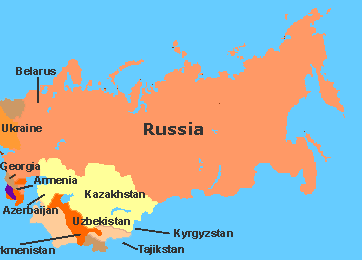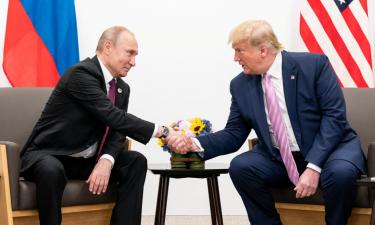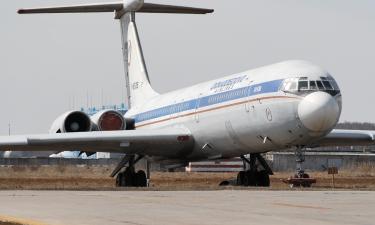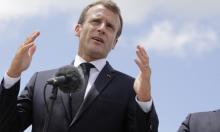Russia to cooperate with the West in the former USSR?
The cooperation with the West on the post-Soviet space is possible, only if strategic interests coincide
It seems that the Russian administration has become rather active on the post-Soviet space after a series of revolutions in several republics of the former USSR. A source in the Kremlin that wished to remain anonymous said that Russia would have to build a civilized dialogue with the EU and the USA regarding the issue of mutual relations on the post-Soviet space. The initiative, the source said, is supposed to strengthen Russia's positions in the Commonwealth of Independent States (CIS). 
According to the official, changes will touch upon relations with the West, first and foremost. “The essence of the new policy is about retrieving Russia's influence, which was supposedly lost as a result of “orange revolutions.” As a matter of fact, there was no such influence: there was only wasted money and stolen Russian natural gas. The point is that relations between Moscow, Washington and European structures on the territory of the former USSR should become civilized,” the anonymous official said in an interview with RIA Novosti.
The source acknowledged that the Russian administration was not paying much attention to the problem in the 1990s. However, said he, the situation has changed a lot during the recent years, when a whole set of various organizations appeared both inside and outside of the CIS: Central Asian Cooperation Organization, Shanghai Cooperation Organization, Collective Security Treaty Cooperation, etc. The GUUAM organization (which unites Georgia, Ukraine, Uzbekistan, Azerbaijan and Moldavia) was created with the participation of the West. GUUAM has become much stronger recently in spite of the fact that one of its members, Uzbekistan, pulled out from it. In addition, the recent Russian-Chinese military exercise has proved the efficiency and importance of Shanghai Cooperation Organization. However, it is about time Russia should start establishing a dialogue with Western organizations.
Similar statements have been released from Russian politicians before. Deputy Foreign Affairs Minister, Grigory Karasin, told the Rossiyskaya Gazeta that Russia was trying to turn the post-Soviet space into the territory of reciprocal and predictable partnership. “We should find a balance, which would renew the atmosphere and our relations here with our Western partners,” said he. The politician added, though, that a revolutionary way and forcible democratization was absolutely unacceptable.
President Putin said after a meeting with British Prime Minister Tony Blair in June that several members of the CIS could be equated with African states from the point of view of their poverty. “They are Tajikistan, Kyrgyzstan, Georgia and Moldova. We must not turn this space into a battlefield. We should make it become the field of cooperation to render assistance to the nations of those states,” Putin said.
Scientists of politics - Vladimir Zharikhin, Vladimir Razuvayev and Valery Khomyakov – presented their comments to Pravda.Ru on the issue of developing cooperation with the West on the post-Soviet space. All the three scientists are certain that Russia should precisely determine goals and tasks of its politics in the republics of the former USSR before such cooperation could be started. They added that Russia had not conducted such activity for the recent 15 years.
Vladimir Zharikhin, deputy director of the CIS Institute:
”We must definitely be a part of the European civilization, but not the supplier of energy resources for the European economy. Respecting great achievements of the European civilization one should not forget the history of mean European politics towards Russia. Therefore, Russia is supposed to consider other directions of cooperation – with China and India, first and foremost.
”The cooperation with the West on the post-Soviet space is possible, only if our strategic interests coincide. Russia must determine its strategic interests on the post-Soviet space first. Such things do not happen, however, that is why Russia views any Western activity on the post-Soviet space as interference in its internal affairs. There was the only exception – the operation in Afghanistan, which was good for both Russia and the West at that time. As for other cases…even Ukraine, for example. Why does Russia need Ukraine? I not talking about spiritual and cultural matters here, which obviously need to be developed and strengthened. I mean the Ukrainian economy, which consumes Russian resources at very low prices.
”Uzbekistan, Georgia, Latvia and Ukraine are all different countries, of course. If Russia is going to deliver its energy to Europe only, Ukraine and Belarus will be the key partners and one may forget about Central Asia. On the other hand, if Russia prefers to develop ties with such prosperous giants as China and India, Central Asia will be the key region at this point.”
Vladimir Razuvayev, the General Director of the Center for Economic and Political Research:
”I believe that the Russian administration has realized that Russia can be considered a superpower from the regional point of view. Russia should concentrate on the relations with its neighbors and on its internal development. It is obvious that Russia cannot oppose the West even on the territory of its neighboring and friendly states. Therefore, it is important to coordinate policies in the CIS with the European Union and the USA. Russia may benefit a lot from it and lose practically nothing. One may obtain additional influence in the Caucasus, in Ukraine and in Central Asia.”
Valery Khomyakov, the Director of the Agency for Applied and Regional Politics:
”The politics, which Russia has been running during the recent 18 months on the post-Soviet space and mistakes, which it made with Ukraine, Abkhazia, Kyrgyzstan, Georgia and Belarus, have made Russia isolate itself from the West. Russia's relations with the republics of the former Soviet Union were different during Boris Yeltsin's stay at power. The Yeltsin's administration did not understand what they could do on the post-Soviet space, but there was more partnership with former Soviet republics back then. The post-Soviet space exists as something single, which includes not only former Soviet republics, but also the Baltic states, whether they like it or not, and even former socialist states in Eastern Europe. However, Russia should develop different approach to each of those states.”
Vadim Trukhachev
Subscribe to Pravda.Ru Telegram channel, Facebook, RSS!





